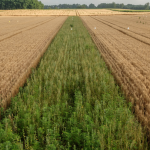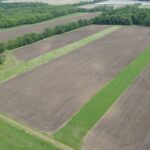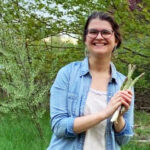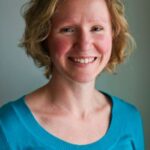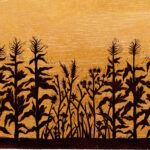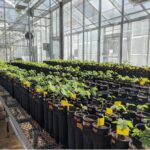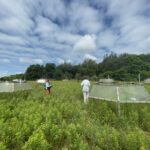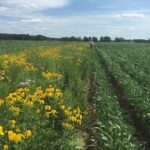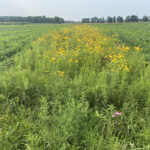New research out of MSU shows that it is possible to manage farmland to address two challenges simultaneously – protecting biodiversity and maintaining ecosystem services. The key is to strategically place native perennial vegetation within agricultural systems, using the innovative practice of prairie strips. Today, 38% of the landscape in the Midwest is planted in row crop agriculture. “We need to make this land habitable for species for the ecosystem services the increased biodiversity can provide to the farms” said Lindsey Kemmerling, the first author of the MSU-led study
Little strips of prairie can go a long way
Prairie strip and soil health farm field day to be held in Cassopolis on August 26th
CASSOPOLIS, Michigan— A farm field day centered on prairie strips and soil health will be held on Friday, August 26th (September 2nd rain date) from 1:00- 3:00 p.m. at the Edward Lowe Foundation. The field day will feature speakers including farmers, land managers, and soil scientists who will describe the implementation, management, and soil health benefits associated with on-farm prairie strips. The event is free and open to the whole family and will include a soil pit demonstration, a wagon tour of prairie strips and refreshments. This field day is supported by Michigan State
Transforming Michigan’s agricultural landscapes – Do prairie strips diversify insect communities in squash production?: Reflections from an LTER Fellow
Jen Zavalnitskaya is a graduate student in Zsofia Szendrei's lab in Michigan State University's Department of Entomology. Her research interests include plant-insect interactions, insect behavior, integrated pest management, and agroecology By the time I began my PhD, I knew I was passionate about promoting the biodiversity of agricultural landscapes. From my masters research in Zsofia Szendrei’s lab, I learned that the ways farmers manage their fields plays an important part in insect pest dynamics. However, the local landscape plays a large role as well. This creates a challenge,
New KBS LTER Artist-in-Residence program aims to create intersection between art and research
This spring, Michigan State University launches the Farmscapes to Forests: Kellogg Biological Station (KBS) Long-Term Ecological Research (LTER) Artist-in-Residence Program, which will welcome artists from across all mediums to spend a week at the Kellogg Biological Station in Hickory Corners, Michigan, followed by a culminating visit in the fall or winter to share their work. Supported by the National Science Foundation, Gretel Van Wieren, Professor in MSU’s Department of Religious Studies, is leading the program in its first collaboration with Dream Scene Placemaking,
Sarah Evans named to prestigious 2022 Earth Leadership Program cohort
Michigan State University microbial ecologist Sarah Evans is one of 22 leading sustainability scientists named to the 2022 North American cohort of the Earth Leadership Program (ELP). The ELP provides outstanding academic researchers with the skills, approaches, and theoretical frameworks for catalyzing change to address the world’s most pressing sustainability challenges, emphasizing new forms of individual and collective leadership. The program enables scientists to work collaboratively with diverse stakeholders and become agents of change within and beyond their
Prairie strip ecology, art, and advocacy in the LTER: Reflections from an LTER Fellow
Corinn Rutkoski is a graduate student in Sarah Evan's lab at the Kellogg Biological Station. She is broadly interested in the use of perennials in agricultural systems, science policy, and soil health. Her research path has been propelled by a reciprocal inspiration among ecology, conservation, and creativity. In September 2018, Lisa Schulte Moore was scheduled to give a seminar at KBS titled Prairie strips improve biodiversity and multiple ecosystem services from corn-soybean croplands. At the time, I was a technician in Sarah Evans’ lab at KBS, considering graduate school
Studying small populations using big experiments: Reflections from an LTER Fellow
Isabela Borges is a graduate student in Sarah Fitzpatrick's lab in the Integrative Biology department at Michigan State University. Isabela won the J.S. Karling Graduate Student Research Award from the Botanical Society of America for her work on plant inbreeding on the legume-rhizobia mutualism. She is broadly interested in the feedbacks between community ecology and contemporary evolution, and their consequences for the persistence of small populations. Summer 2021 was a busy one. When I first proposed to conduct an experiment on two thousand plants, that just seemed like a nice large
Disentangling the complex effects of climate change on above and belowground communities: Reflections from an LTER Fellow
Graduate researcher, Moriah Young, is a Ph.D. student in Dr. Phoebe Zarnetske’s lab at Michigan State University. The lab uses open top chambers (OTCs) to study how biotic interactions and climate change directly and indirectly affect community structure and function at the KBS LTER. Climate change is a pressing threat to ecosystems around the world. From warmer temperatures to more unpredictable rainfall, climate change has shown to have a myriad of effects on ecosystems. Most research has focused on direct effects of climate change on species. For example, how does warming
Species interactions in prairie strips: Reflections from an LTER Fellow
Graduate researcher, Alice Puchalsky, is a Ph.D. student in Dr. Nick Haddad's lab at Michigan State University. Her research focus is on moths, butterflies, and interaction networks. When I began graduate school, I did not imagine myself eagerly watching a caterpillar writhe around in a plastic cup, wondering about its fate. But, that is where I found myself this past summer. I also did not imagine the delight I would feel in checking on that caterpillar the next day and finding that approximately 30 very small parasitic flies had emerged from that caterpillar’s body. I was hoping that
Scaling-up conservation practices: How much can farmers afford?
East Lansing, MI – Prairie strips planted into row crops have the potential to contribute a suite of ecosystem services, such as improved soil health, water quality, and wildlife habitat. When it comes to implementation, farmers have to weigh these environmental benefits as well as the economic cost of taking land out of production. In a new study, released online by Land Economics, Michigan State University (MSU) researchers find that 20% of corn and soybean farmers in the Eastern Corn Belt are willing to convert 5% of their largest corn-soybean fields to prairie strips if paid the same
- « Previous Page
- 1
- 2
- 3
- 4
- 5
- …
- 17
- Next Page »
